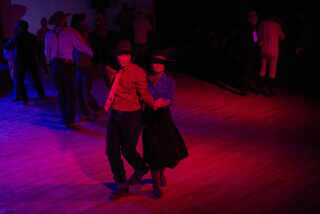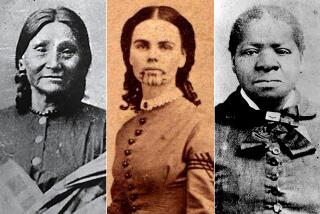Women Make Peace With Life on a Kansas Ranch
- Share via
Charleyhorse by Cecil Dawkins (Viking: $15.95)
Cecil Dawkins is a wonderfully wicked writer. In “Charleyhorse,” her second novel, Kansas is a place where the tractor goes chucketty-chucketty-chucketty, where the kitchen always smells like Thanksgiving, where girls with names like Gloria Linderman cruise coffee shops looking for rodeo queen votes.
But amid all of this complacency that brings to mind the magic of adolescent novels, Dawkins throws a wrench into things, giving us some potent themes to consider--a troubled mother-daughter relationship and a homosexual rite of passage.
Home on the Range
“Charleyhorse” is the story of four strong women who live on a vast cattle ranch in Tula, Kan., and how they separately and together make their feisty peace with choosing a home on the range.
Belle Burden, the ranch mistress, has a row of six Styrofoam heads lined up on the dining room buffet that hold her six, different-colored wigs. She doesn’t lift a finger on the ranch, unless you count changing the dial on the television. She leaves this considerable task to her daughter, Charlene (“Charley”), who seems to have been born for cattle raising and horse breeding. All of it in exchange for room and board. It is this inequity that fuels the fire between mother and daughter, but like all fires, there is a source; in this case, Belle’s obsessive idolizing of her late son, Clay.
Lady, the black cook and ranch referee, has a good pulse on the Burden women. When Belle, sitting there tweezing her eyebrows, sighs pathetically, “This family is afflicted. All prominent families are. . . ,” Lady looks up from shelling peas to reply: “I never had to get prominent to get afflicted.”
Into this group comes Juna, a feminine New York City schoolteacher whom Belle takes in as a boarder to provide “some lively, intelligent conversation.” The real hope is that Charley will look up from birthing calves long enough to know a role model when she sees one.
Juna, however, provides far more than lively conversation, as she and Charley enter into a friendship that goes deeper than they, or anyone around them, had planned on. It is this relationship that forces Belle’s daughter to lay claim to a sense of worth that has long eluded her.
Though the women appear to be blessed with the stuff that makes for survival, the men in the novel don’t fare nearly as well. They are suicides, womanizers and simpering suitors. Does the author tip the scale in favor of her celebration of women? Yes. Does it matter? No. Miraculously, “Charleyhorse” is never apologetic, polemical or self-serving. Tula, Kan., we are told, is a place people pass through to get to somewhere else. Cecil Dawkins makes it recommended travel.
More to Read
Sign up for our Book Club newsletter
Get the latest news, events and more from the Los Angeles Times Book Club, and help us get L.A. reading and talking.
You may occasionally receive promotional content from the Los Angeles Times.










